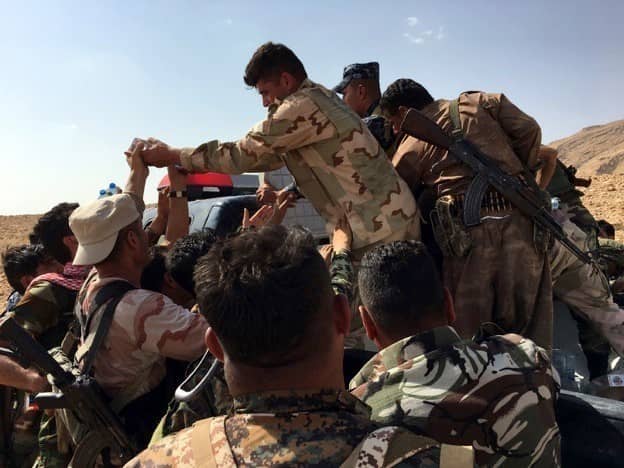A Soldier salutes a fallen comrade for the final time in Iraq.
The recent attack on U.S. forces in Jordan, specifically at a military base near the Syrian border, marks a significant and tragic event in the ongoing Operation Inherent Resolve. This operation, primarily aimed at defeating ISIS, has been a cornerstone of U.S. and coalition efforts in the region. The attack, carried out by an uncrewed aerial system (UAS), resulted in the tragic deaths of three U.S. soldiers and injuries to over 40 service members. This incident underscores the evolving nature of threats faced by military personnel in these regions and the complexities of the geopolitical landscape in the Middle East.
Operation Inherent Resolve (OIR) was initiated to combat the threat posed by ISIS. It represents a concerted effort by the U.S. and its coalition partners to ensure the lasting defeat of this terrorist organization. The operation has primarily focused on Iraq and Syria, but the presence of U.S. forces in neighboring countries like Jordan highlights the broader regional implications of this mission.
The recent attack occurred in the early hours at a logistics support base, part of the Jordanian Defense Network. The base, hosting approximately 350 U.S. Army and Air Force personnel, was struck by a one-way UAS, directly hitting the container housing units and leading to the deaths and injuries of U.S. service members.
The casualties in this attack included Sgt. William Jerome Rivers, Spc. Kennedy Ladon Sanders, and Spc. Breonna Alexsondria Moffett, all assigned to the 718th Engineer Company, 926th Engineer Battalion, 926th Engineer Brigade, Fort Moore, Georgia. Their tragic deaths have been a significant blow to the U.S. military community and their families.
In response to the attack, Secretary of Defense Lloyd J. Austin III expressed deep sadness and outrage, highlighting the bravery and sacrifice of the service members. The Department of Defense, along with the entire nation, mourns their loss.
More than 40 service members were injured in the attack. Eight of these personnel required medical evacuation to the Baghdad Diplomatic Support Center, with three scheduled for transport to Landstuhl Regional Medical Center for advanced care. The other five are being treated for mild traumatic brain injuries (TBIs) and are expected to return to duty.
The Department of Defense (DOD) and U.S. Central Command (Centcom) are actively investigating the attack. Deputy Pentagon Press Secretary Sabrina Singh mentioned the complexity of assessing how a one-way attack drone could impact the facility. While definitive attribution has not been made, there are indications of involvement by an Iranian-backed militia, possibly Kataib Hezbollah. This points to Iran's role in arming and equipping groups to launch such attacks.
This attack in Jordan is notable as it is the first to result in U.S. fatalities in the country and demonstrates the reach and capabilities of hostile entities in the region. It highlights the ongoing risks to U.S. and coalition forces in the Middle East. Over the past months, U.S. service members and facilities have faced numerous attacks in Iraq and Syria, reflecting the persistent volatility and threat in the region.
The U.S. government's response to this attack is under careful consideration. President Joe Biden, along with his national security team and Secretary of Defense, are deliberating on the appropriate course of action. The U.S. remains committed to responding effectively while emphasizing that it does not seek wider conflict in the Middle East or with Iran.
The loss of Sgt. William J. Rivers, Spc. Kennedy L. Sanders, and Spc. Breonna A. Moffett brings a personal dimension to the cost of military operations overseas. Their service and sacrifices, along with their distinguished records and awards, are a testament to their commitment and dedication to their country.
The attack in Jordan serves as a somber reminder of the ongoing challenges and dangers faced by U.S. and coalition forces in the Middle East. It underscores the need for vigilance, robust security measures, and a nuanced understanding of the region's complex dynamics. As investigations continue and responses are formulated, the focus remains on safeguarding the lives of service members and achieving strategic objectives in the fight against terrorism. The legacy of the service members who lost their lives in this attack will not be forgotten, as their sacrifice continues to inspire and inform the mission of Operation Inherent Resolve.




